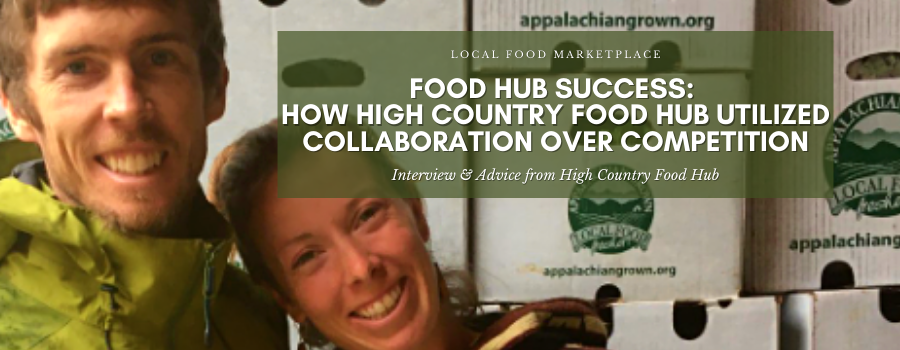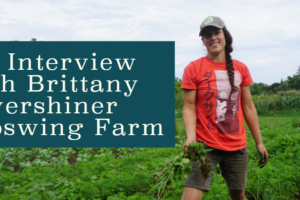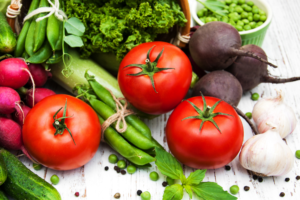Since 2009, Local Food Marketplace has supported hundreds of food hubs by providing a streamlined sales and distribution platform backed by our expert support staff.
We’ve put together an informative blog series focusing on stories of successful food hubs we’ve worked with for years. In Part 1, we spoke with the Alaska Food Hub and learned the importance of resource sharing when starting a new food hub. In Part 2, we interviewed the Kansas City Food Hub to find out key advice and lessons. Now in Part 3, we met with High Country Food Hub to learn how a demand for local food storage and distribution and utilizing collaboration over competition led to its success.
As new food hubs continue to emerge, we hope this series serves as a valuable resource to those starting out.
Part 3: High Country Food Hub
In February 2016, the Blue Ridge Women in Agriculture joined with the Watauga County Board of Commissioners to create High Country Food Hub in Boone, North Carolina. As the demand for food storage space from farmers and area food banks grew, the hub saw an opportunity to support local food producers through product storage, aggregation, and distribution.
Starting with just one freezer, High Country Food Hub quickly outgrew its resources as local ranchers utilized its storage services. With funding from the city government, the hub then expanded into a second freezer to meet the needs of local food producers.
By 2017, the hub knew that a lot of area farmers were applying to farmers markets but were getting turned down due to limited space. Wanting to provide avenues for fresh food sales without competing with long-standing community farmers markets, the hub adopted the LFM platform to bring the market online.
Now in its fourth year of operation, the High Country Food Hub supports over 90 farmers and food producers across three states. We recently had the opportunity to talk with the Food Hub to learn how the demand for cooperative hub resources led them to serving over 3,000 local products for over 300 orders each week.
Key Challenges to Starting the Food Hub
-
- Competition vs Collaboration
- When High Country Food Hub started, it was mindful of perceived competition from treasured local farmers markets. One of the initial goals was to show farmers and food producers how the hub could be a win-win if everyone worked collaboratively on the effort.
- Funds for Infrastructure
- As with all new businesses, funding can prove to be a difficult challenge to overcome when starting out. Due to partnerships with the county government and larger grants, in 2016 the Blue Ridge Women in Agriculture began High Country Food Hub.
- In February 2016, the Watauga County Board of Commissioners approved 1,400 square feet of the Watauga County Agricultural Services Center to be transformed into freezers, refrigerators, and dry food storage space. Then additional funding came from Heifer USA and the USDA’s Local Food Promotion Program to renovate the space and buy a commercial freezer and cooler.
- Competition vs Collaboration
Learning from Failure
All businesses experience failure on some level, but gleaning lessons from those failures is a key to success. Although High Country Food Hub was receiving support from governmental agencies, it still struggled with guidance on how to develop the hub and respond to change.
In February 2020, a regional grocery store closed and the hub gained 12 new customers. At that time, that was significant expansion and change for High Country Food Hub. However, when COVID hit in mid-March, the hub experienced major sudden growth in both customers and sales. By May 2020, it went from 112 to 530 customers and increased sales by $26,000!
“We quickly ran out of cold storage and had to change our processes week to week about how we organize and aggregate orders while dealing with new customers and producers. That transformation was pretty amazing,” says Shannon Carroll, Finance Coordinator for High Country.
However, too much change can come at a price. Each week the food hub was responding to the pandemic by constantly changing, which ultimately threw off the entire systems, causing more problems than solutions.
“Try to limit constant changes and adjustments, so you can fine tune your systems and truly learn what works and what doesn’t,” advises Liz.
Advice for a New Food Hub
Focus on Community Relationships and Collaboration. When COVID-19 changed it operations, High Country Food Hub worked with the statewide food council and partners at the Carolina Farm Stewardship to connect with major distributor SYSCO. Since SYSCO was not running its refrigerated trucks, the food hub connected with SYSCO to borrow its refrigerated trailer.
Soon thereafter, the food hub started reaching out to everyone in its network to see what it could borrow to determine what the hub needed long term. Another unexpected collaboration came in the form of a popular soda company: Dr. Pepper. The hub was able to borrow drink coolers for perishable products to expand product inventory and support the influx of customers and producers.
Additional community collaborations came from the County Economic Commission, the Golden Leaf Foundation, and other statewide foundations to fund another walk-in cooler and more infrastructure for the Food Hub.
Software Solutions with LFM
“LFM really seemed to fit what we needed to do, and was an excellent decision looking back,” states Shannon. Here are key reasons why High Country Food Hub chose LFM:
-
- Reasonable start-up costs and the ability to grow as more functionality is needed.
- The food hub started with LFM in 2017, but by 2020, it had grown exponentially. LFM offers customizable packages and modules so you can expand affordably with full support from the Support staff.
- Tools available to producers for easily managing products and inventory.
- LFM provides not only substantial reporting and data tools for Admins, but also for producers who sell through the sites, too. Shannon says this has even allowed for some of its producers to hire staff for data management.
- Producers and Admins have the ability to update meat prices to the exact weight of items in inventory and orders. This leads to more accurate sales data, producer payments, and satisfied customers.
- In-depth data exports for growth management, harvest forecasts, and grant writing.
- High Country heavily relies on grants and other funding efforts to support its 90+ producers and multi-state customer community. LFM provides exportable, in-depth reports for all aspects of your business or organization. From customer data exports to revenue to items sold vs. listed, LFM offers an unmatched reporting database accessible to LFM customers at anytime with no additional fees.
- A responsive Support staff that offers a clear onboarding process and provides continuous support.
- From the very start with LFM, the hub was given clear answers and instructions as to how to setup and manage its online storefront. “Amy met with us early on to answer questions that we had, give us a demo, and even connected us to food hubs in Alaska and Hawaii to speak to,” Liz shares. “Nick helped us get everything set up, and even though our team was tech savvy, we loved the support on the back end from LFM. The Support team and step-by-step process was very helpful in onboarding.”
- Another aspect to LFM that’s important to the food hub is the responsiveness of the LFM team to feedback, feature requests, and questions. The hub is excited about upcoming things like EBT payment options through LFM and the educational webinars LFM offers.
- Reasonable start-up costs and the ability to grow as more functionality is needed.
Want to learn more about how to be a successful food hub?
Check out our blog posts below:
-
- Food Hub Success: Pivoting Amid a Crisis with the Kansas City Food Hub
- Food Hub Success: Key Advice from Alaska Food Hub
- Higher Than Ever Sales: Market-to-Go at Grow Oak Ridge
- Worried About Customer Retention: Focus on This
- Scaling Up to Address Food Security on the Island
- Download: Food Hub Guide’s to Selling to Restaurants
Learn more about LFM and how we support food hubs.
Schedule your Demo today!




